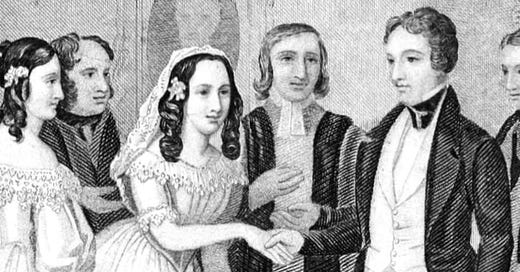1st Case of a Judicially-Alienated Mama
Famous Mother Alienated from Daughter in Early 1800's
The first documented case of a mother having been judicially-alienated from her child occurred in the early 1800’s. And it happened to a most remarkable woman.
She was the first woman to publicly proclaim in writings and on lecture tours that women are equal to men—as citizens and human beings. Her work was a precursor to the Suffragist movement.
As a vocal, confident, articulate woman who refused to be limited in her role because of her sex, Wright stands out as a model for women who followed.
Frances Wright’s case is part of our “History of the Crisis” series. This series aims to provide perspective that informs the understanding of the true nature and cause of the Custody Crisis. It includes many well-known women, including Princess Diana, as both a child and mother, and whose mother was also named Frances.
Frances Wright’s remarkable life was destroyed as a result of her not having the power to maintain custody, while her ex had the power to take and alienate her child from her.
Sound familiar?
But there is a silver lining, so be sure and read to the end…
FRANCES’ STORY
Frances was born in Scotland in 1795 to wealthy parents. Unfortunately, they both died when she was young, so she was raised by a relative in England.
Frances received a sizable inheritance and was part of the upper class. She was well-educated and focused on a career in writing, which would underpin her activism.
In her teens, Frances became fascinated with the ideals of freedom and democracy in the United States. She believed the phrase from the Declaration of Independence “All men are created equal” should apply to all human beings, including women and blacks.
At 23, she set sail for a two-year tour in the U.S., but she came to love it there and decided to stay. She felt her radical activism would do better there.
Frances would often visit France and became friendly with the Marquis de LaFayette, hero of both the American and French Revolution. It was rumored that she had an affair with him.
When LaFayette later came to the U.S., he introduced her to the founding fathers. Still in her ‘20’s, she got Thomas Jefferson to agree with her plan to end slavery and soon founded her own utopian community, the Nashoba Commune, in Tennessee.
Frances was against organized religion. She believed in an education based on science, free from religious superstition. She supported the rights of working people and advocated for universal education, along with equal rights for women.
Frances was the foremother of the liberated woman and was the first to condemn marriage as a form of slavery. This threatened men’s control over women and earned her a lot of backlash. She was described as a “harlot of infidelity” and “bold blasphemer and voluptuous preacher of licentiousness” and a "female monster" who dared to take the public-lecture platform—unacceptable female behavior.
But she was convinced of her seemingly radical beliefs and, due to her high status, was able to continue to lecture widely. She firmly believed the best way to incite reform was through educating the public via writing and lecturing.
Reform, to be effective, must be rightly understood in its principles by a collective body politic, and carried forward wisely, consistently, with due regard to the interests of all concerned, by that body politic.
She wrote in a free press publication and authored many books and plays.
MOTHERHOOD & MARRIAGE
But that all came to an end when Frances was 35, a virtual spinster in her time. In 1830, she sailed to France and became pregnant by one of her lovers. This posed a problem because, although she openly believed in sex outside of marriage, she thought she would be ostracized from polite society and it would harm her activism. She was most concerned, though, that her child would bear the stigma of “illegitimacy”, quite damaging to the lives of illegitimate children in those days.
So she went into seclusion in Scotland to hide her pregnancy, and the French father went with her. In December of 1830, Frances gave birth to Sylva, but it was not until six months later that she married the father. She gave birth to another child in 1832, who died shortly after birth.
Problem solved. Frances gave Sylva her deceased child’s birthday so it would appear as if she had been married when she gave birth to Sylva. No issue of illegitimacy. It was a secret they would both keep until their death.
Frances traveled back to the U.S., but the marriage was seriously on the rocks. Unsurprisingly, Frances did not like being married. By 1836, when Sylva was just 4 (really 6), they had separated. Thus began a childhood-long battle for custody of Sylva and the father’s attempt to take all of Frances’ money.
The father was given temporary custody of Sylva and began his campaign to alienate her from Frances. Frances’ mental and physical health declined precipitously. She suffered “nervous breakdowns” (as they were called in the day).
Frances never regained custody, though she tried mightily throughout Sylva’s childhood. She had all the money necessary for the best representation in court, but it made no difference. He was the man/father with all the power, and she was the woman/mother with no power.
In 1838, Frances withdrew from public life and activism. She was never again able to be the powerhouse she had been, lecturing and fighting for equality. It is ironic that her own inequality and lack of power led to her inability to maintain custody and protect her own child from being alienated from her. Not to mention being financially devastated.
By her teenage years, Sylva was estranged completely from Frances. As a young adult, Sylva even started a campaign publicly opposing Frances’ work for for women’s equality. That’s how bad the brainwashing had been.
In 1850, after Sylva was an adult and aged out of the system, Frances was finally granted a divorce. Her ex-husband and Sylva were awarded her entire property, including all her earnings from lectures and royalties.
She had to live in Sylva’s property, which had been hers, in her last years. Frances died just two years later, in December of 1852 at fifty-seven years old. Sylva had refused to visit her to the end, despite her substantial inheritance from her.
SILVER LINING
Towards the end of Sylva’s life, she apparently realized the truth—that she had been alienated from her mother by her father. She seemed to have even realized that her mother was right about women being equal to men.
So she enacted a beautiful memorial to Frances at her gravesite, something quite unique for a mere woman in those days.
Sylva had inscribed on the memorial the titles of all her mothers’ books and Frances’ own words:
I have wedded the cause of human improvement, staked on it my fortune, my reputation and my life.
It is now a tourist site in Ohio.
Notice Frances used the term “wedded”. Until the end, she considered herself married to her cause of equality, not the father of her child, whom she was forced to marry due to the ignorance of the public at that time.
Frances Wright was a precursor of progress, a prophet of an idea whose time had not yet come. As with most prophets, her legacy lies not in reforms she accomplished, but in the inspiration she gave to others of more practical bent.
TAKEAWAYS
The issue of alienation is front and center in Frances’ story. If her child had not been taken and alienated, her life likely would have gone much differently. Her story is emblematic of the destruction of lives and human potential via judges having the power to grant men custody and allow them to keep children away from the mother.
It also shows that the judicially-enabled alienation of children from mothers goes way back. A mother’s bond with her children has always been men’s #1 weapon in their war to keep power and control over “their” women and “their” property. Family Court was created by men for men to continue this entitlement.
Frances’ story shows that alienation, on the extreme end, is really brainwashing of children. These days, Family Court judges appoint insider therapists to aid in this manipulation, the goal of which is keeping children under the control of the father.
Lest you think this is a rare phenomena, check out the results from one of our surveys. Nearly half of the mothers were completely alienated from their children, with nearly 40% experiencing hostility, after custody was switched to the father.
This alienation of children from mothers should be getting the most attention these days, as it is so devastating to both, but too many activists focus on mothers being wrongly accused of alienating. While that is a problem, the term and concept are not the problem and banning it won’t make any difference. The real problem is judges are lying about mothers alienating, while enabling fathers to truly alienate.
Anyway, Frances had all the status and money necessary for the best representation in court, but it made no difference. He was the man/father with all the power, and she was the woman/mother with no power.
Sound familiar?
This power to take and alienate children goes back to the beginnings of Patriarchy circa 12K years ago. Despite women’s progress, women have no more power in the family than they did 200 years later. Only now, men have created a specialized “Family Court” system that makes it even easier for judges to lie about women and switch custody.
Join The Women’s Coalition where we are fighting for a new system.
In the end, it appears Frances’ daughter came around and saw the truth. Better late than never!
Maybe someday, some of the countless judicially-alienated children will realize they were victims of this systemically-induced manipulation. And if their mother is gone, maybe they will make some sort of memorial—to the one who fought so hard to keep and protect them…
You may also give a gift subscription to a friend who is a victim of the Custody Crisis.
Or feel free to support the Coalition’s work through a one-time or recurring contribution through the Paypal Giving Fund.
All contributions are greatly appreciated!







